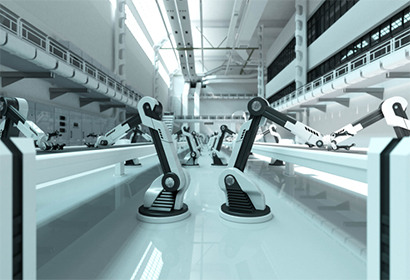RPA In The Manufacturing Automation Solutions
Meta Description:
Many factories have thought of using manufacturing automation solutions in the production process, but many times they do not know how to maximize the efficiency of automation. If you don't know, come and read this blog!

The Manufacturing Industry In the New Technology Era:
Since the advent of the Internet, it has gradually become a catalyst for many technologies. Based on Internet technology, people continue to create technologies such as big data, cloud computing, the Internet of Things, artificial intelligence, and virtual reality. These technologies continue to weave a new era of technology and new life for people, forming the so-called "technology metaverse". At the same time, manufacturing plants around the world are using new technologies to increase efficiency and generate more profits.
Driven by many technologies, manufacturing has entered the era of Industry 4.0. The era of Industry 4.0 means that manufacturing is moving from a traditional product-based model to a new digital platform-based model.
The manufacturing industry in the era of Industry 4.0 should have the following characteristics:
1. Connected, Intelligent and Autonomous
The Manufacturing industry has been connected to the Internet since the early 2000s, but it was only recently that the Internet became intelligent and autonomous. In order to connect everything together, many technologies were needed (RFID, Bluetooth, GPS ...). Nowadays, you can find sensors everywhere in factories and companies can track every movement of their employees and even their tools if they want to (see the example below). For example, some companies have installed cameras on their production lines to monitor the movements of workers and their work quality.
2. Cloud Computing
Cloud computing has allowed companies to store data collected in their factories on remote servers so they can analyze it at any time without having to install expensive software on their PCs or tablets. For example, some factories use cloud computing services like Google's BigQuery or Amazon's Redshift which let them analyze large volumes of data stored in their databases over the internet (e.g., sales data from e-commerce websites).
Automation Is The Future Of Manufacturing:
The world is changing, and so are manufacturing systems. The traditional way of manufacturing has been replaced by technology-driven processes. The new generation of manufacturing automation solutions is making things easier for the manufacturers and helping them to reduce their operational costs.
Automation refers to the use of machines or mechanical processes to perform a task automatically without human intervention. It is often used interchangeably with robots or robotic process automation (RPA). However, RPA is a subset of automation that includes software-based machines that mimic human actions by following a set of instructions.
Robots are used in many industries such as automotive, aerospace, food & beverage and electronics. They are designed to perform repetitive tasks that can be dangerous for humans or too difficult for them to do manually. Examples include welding parts together on an assembly line, picking up screws off a conveyor belt and assembling electronic components into computer chips.
In the past decade, the focus of manufacturing has been to streamline processes and improve efficiency. Automation is one of the biggest advancements in this area. It has helped factories reduce costs, improve quality and increase profitability. As a result, there has been an increasing demand for automation solutions such as robotic process automation (RPA).
RPA is an emerging technology that helps organizations automate their business processes. A few years ago, RPA was only used by large companies with huge operations and lots of manpower at their disposal. However, today it has become affordable enough for small businesses to implement it into their operations as well.
How Does RPA Work And Why Is It Important For Manufacturing?
RPA uses software bots (robots) to replicate human tasks. These bots are programmed to follow specific rules and perform repetitive tasks that can be easily automated.
Automation software bots can be used for both simple and complex applications. They can take over tasks that are too repetitive or too simple for humans to do quickly and accurately enough. The bots can also handle tasks that require human interaction in order to complete the job successfully.
Moreover, manufacturers have always used machines to automate their processes but these machines were expensive and required significant manual intervention from operators at every stage of production. With RPA technology, manufacturers can now automate their processes with software robots that don’t need any manual intervention or supervision by humans.
Next, we will talk in more detail about the RPA used in automation solutions:
RPA Automation Solutions Applied In The Manufacturing Industry:
As per a research report by Forrester Research Inc., “RPA will be adopted by 30%+ of companies worldwide by 2021”. With this much adoption rate, it is evident that RPA will be a major player when it comes to automating business processes in the near future.
As mentioned above, RPA is a subset of automation. So what can RPA automation solutions do for manufacturing plants?
1. Workforce Optimization:
RPA can optimize the workforce by automating tasks like customer service, order processing, etc. This helps reduce human errors while increasing productivity at the same time.
2. Manufacturing Execution System (MES) Integration:
RPA helps integrate existing MES systems into ERP systems and other business systems, so that data can be accessed across different departments and applications with ease. This helps improve inventory management as well as reduce costs associated with manual processes such as reconciliations or manual data entry.
3. Mobile
While many industries are moving to mobile devices and cloud computing environments, some companies still rely heavily on desktops or other stationary systems. These systems are not always compatible with mobile apps or cloud storage platforms like Dropbox or Google Drive. For these organizations, a combination of robotic process automation software and cloud-based tools can provide employees with access to information wherever they want.
4. Streamline Order Fulfillment Processes:
The order fulfilment process is a complex one involving multiple steps such as order intake, picking items from inventory, packaging them and finally shipping them to customers’ addresses across the globe. A lot of manpower is required to run this process smoothly but with RPA automation solutions applied in order fulfilment processes, all you need is computers.
5. Monitor Quality Control Checks:
Quality control checks are typically done with the help of manual workers who spend hours checking products against quality standards. The problem with this approach is that there may be human error involved in the process which leads to inaccurate results. With RPA, you can let computers take over this task by running checks automatically and reporting back on the results without fail. This frees up your employees so they can focus on other tasks that require their attention.
Conclusion:
In the age of Industry 4.0, it is never too early to use automation. For manufacturing, the earlier you use process automation, the greater the benefits.
So we recommend Cyclone as your partner. You will get quality product service at an affordable price and be able to successfully automate your factory. Now Cyclone offers the opportunity to receive RPA robots for free, come and try it!





